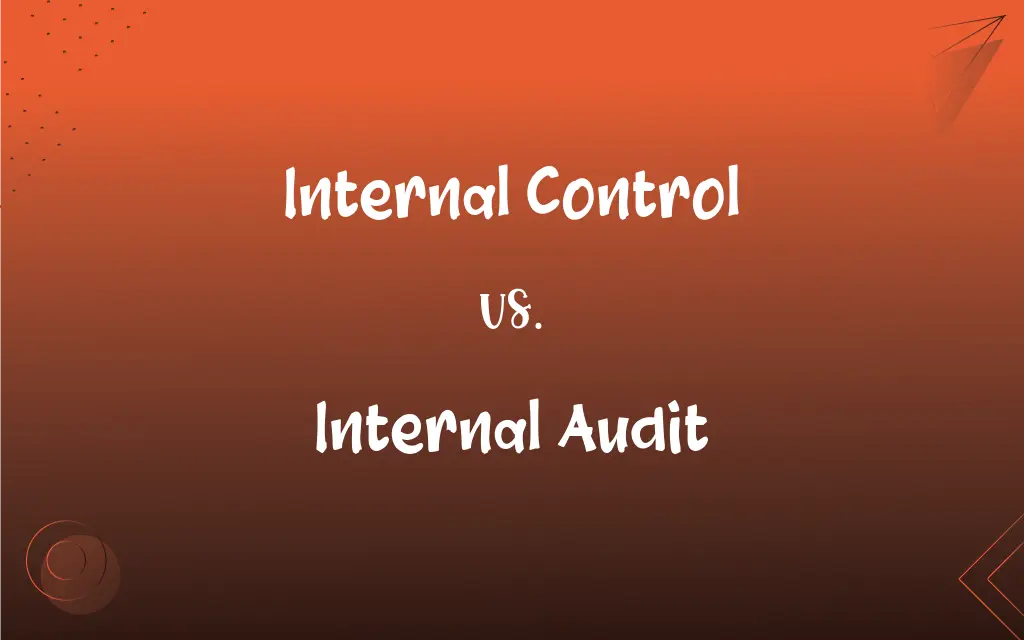Internal Control vs. Internal Audit: What's the Difference?
Edited by Aimie Carlson || By Harlon Moss || Updated on October 23, 2023
Internal control is a system of checks and balances within a company, while internal audit is an independent evaluation of those controls.

Key Differences
Internal control refers to the processes, systems, and mechanisms implemented by an organization to ensure that its objectives are achieved efficiently and effectively. It encompasses various measures to safeguard assets, ensure accurate financial reporting, and promote compliance with laws and regulations. On the other hand, internal audit is a specialized function that assesses the effectiveness and efficiency of these internal controls. Internal audit provides assurance to the management and board that internal controls are operating as intended.
Internal control acts as the backbone of a company's operational structure. It involves a set of rules, policies, and procedures that guide employees and processes to mitigate risks and achieve organizational goals. Conversely, internal audit is an oversight mechanism. Its main purpose is to objectively evaluate and test the internal control system, identifying any gaps, inefficiencies, or non-compliance.
The design and implementation of internal control is typically the responsibility of management. It ensures that the organization is functioning correctly, data is reliable, and there is adherence to policies and regulations. Internal audit, however, operates independently from management. Its primary focus is on reviewing the effectiveness of internal control, offering recommendations, and ensuring that risks are properly managed.
Internal control can be thought of as the day-to-day measures taken by the company to keep operations running smoothly and securely. It's about the steps taken to prevent errors or fraud from occurring. In contrast, internal audit is the periodic check on these measures, aiming to offer an unbiased perspective on how well the internal control system is functioning and where improvements can be made.
Comparison Chart
Purpose
Ensures daily operations run smoothly
Evaluates the effectiveness of controls
ADVERTISEMENT
Responsibility
Managed by company's management
Independent function within organization
Frequency
Continuous daily processes
Periodic evaluations
Focus
Preventive measures against errors/fraud
Assessment and recommendations
End Result
Secure and efficient operations
Assurance and insights
Internal Control and Internal Audit Definitions
Internal Control
Measures taken to ensure the reliability of financial reporting.
Internal control procedures are in place to guarantee the accuracy of our quarterly statements.
ADVERTISEMENT
Internal Audit
A tool for risk management, ensuring potential threats are identified and addressed.
Through internal audit, the company identified several potential risks in its supply chain.
Internal Control
Mechanisms ensuring compliance with regulations and policies.
Their internal control system ensures that all regulatory requirements are met.
Internal Audit
An objective examination identifying operational inefficiencies and recommending improvements.
The recommendations from the last internal audit led to significant cost savings for the company.
Internal Control
A set of rules guiding operational processes to achieve organizational objectives.
The new software is a part of our internal control to streamline financial reporting.
Internal Audit
A function providing assurance on the effectiveness of internal controls.
The board relies on internal audit findings to make informed decisions.
Internal Control
A structure preventing potential errors or fraudulent activities within an organization.
With the recent incidents of fraud, the company is focusing more on strengthening its internal control.
Internal Audit
An independent assessment of an organization's controls and processes.
The internal audit revealed some gaps in our procurement process.
Internal Control
A system of procedures implemented by a company to safeguard assets.
The company established robust internal control to prevent asset misappropriation.
Internal Audit
A systematic review to ensure compliance with laws, regulations, and policies.
Our annual internal audit ensures we adhere to all industry-specific regulations.
FAQs
What is the main purpose of internal control?
To ensure operations run smoothly, assets are safeguarded, and there's compliance with regulations.
Who is responsible for establishing internal control?
The company's management is typically responsible.
Can a company operate without internal control?
While possible, it's risky as there won't be measures to prevent errors or fraud.
Is internal control only about financial matters?
No, it covers operational, compliance, and reporting aspects too.
Is the internal audit function independent?
Yes, it operates independently to ensure unbiased assessments.
What tools do internal auditors use?
They use various tools, including audit software, risk assessment frameworks, and data analytics.
How often should an internal audit be conducted?
It varies by company, but typically it's done annually or as needed.
How does technology impact internal control?
Technology can automate and enhance controls but also introduces new risks that need controls.
Do external auditors rely on internal audit findings?
Often, they do consider them to understand the internal control environment.
What components make up a strong internal control system?
It includes control activities, risk assessment, information and communication, monitoring, and control environment.
Do all businesses require internal controls?
Ideally, yes. All businesses benefit from controls, regardless of size.
Are internal control and internal audit interdependent?
Yes, internal audit evaluates the effectiveness of internal control.
Do internal auditors report their findings to management?
Yes, they report to senior management and often to the board or audit committee.
What's the role of an internal audit?
To objectively evaluate and test the effectiveness of internal controls and provide recommendations.
Why is internal audit important for stakeholders?
It provides assurance that the organization's controls are effective and risks are managed.
Can internal audit findings be ignored?
Ignoring them is risky as it may lead to operational inefficiencies or non-compliance.
How does internal control impact an organization's reputation?
Strong controls can enhance reputation, while weak controls can harm it due to errors or scandals.
Can internal control guarantee no fraud will occur?
No system is foolproof, but strong controls significantly reduce the risk.
Can internal audit make changes to internal control?
They can't make direct changes but can recommend improvements.
What qualifications do internal auditors typically have?
Often, they have certifications like CIA (Certified Internal Auditor) and relevant experience.
About Author
Written by
Harlon MossHarlon is a seasoned quality moderator and accomplished content writer for Difference Wiki. An alumnus of the prestigious University of California, he earned his degree in Computer Science. Leveraging his academic background, Harlon brings a meticulous and informed perspective to his work, ensuring content accuracy and excellence.
Edited by
Aimie CarlsonAimie Carlson, holding a master's degree in English literature, is a fervent English language enthusiast. She lends her writing talents to Difference Wiki, a prominent website that specializes in comparisons, offering readers insightful analyses that both captivate and inform.































































